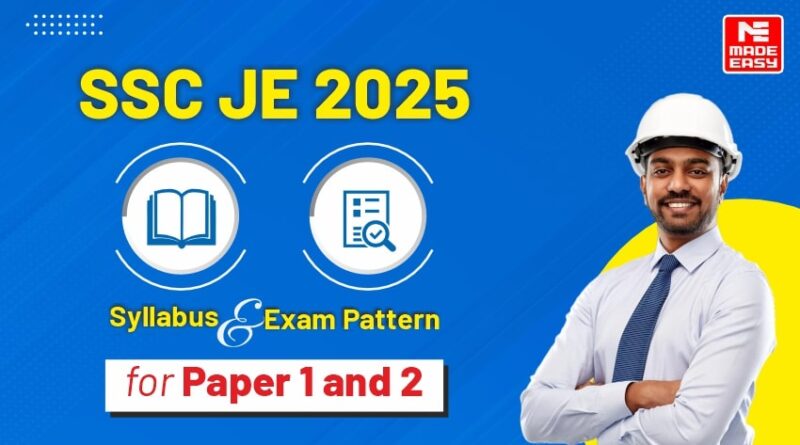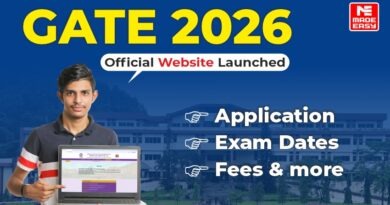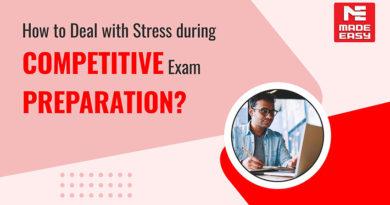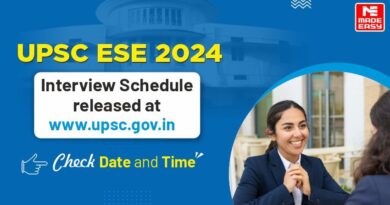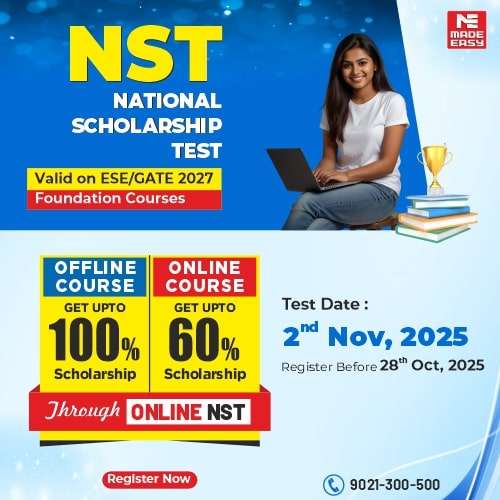SSC JE 2025 Syllabus and Exam Pattern for Paper 1 and 2
The Staff Selection Commission, SSC, conducts a junior engineer exam every year to recruit young and skilled engineers for various departments/ministries of the Government of India. The Staff Selection Commission, announcing 1,731 vacancies (tentative) for Junior Engineers (Civil, Mechanical, and Electrical) across various departments and organizations under the Government of India. The SSC JE exam is one of India’s most challenging yet opportunity-creating government exams. It is obvious the upcoming SSC JE 2025 exam will create career opportunities for aspiring engineers. MADE EASY, with years of experience in teaching, has always advised students of the importance of having a detailed knowledge of the syllabus and pattern of SSC JE. The blog will provide the SSC JE 2025 exam syllabus and pattern for the aspirants who are aiming to qualify for SSC JE 2025.
While, The SCC JE 2025 official notification carrying all the important information of the exam, including the syllabus and exam pattern. The syllabus given below (SSC JE 2025) will guide the candidates to start with their preparation.
SSC JE 2025
Each year, the Staff Selection Commission, also referred to as SSC, holds an open competitive examination with a specific SSC JE Syllabus and Exam Pattern for the recruitment of junior engineers (civil, electrical, mechanical, and quantity surveying & contracts) for various departments/organizations in the Government of India. These posts are Group B (Non-Gazetted), in Level-6 (₹35,400 – ₹1,12,400/-) of the pay matrix of the 7th Central Pay Commission.
Thousands of engineering graduates appear for the SSC JE exam in order to secure a reputed job with the Government of India. Before the students begin their preparation, the most important thing that is required is to understand the SSC JE exam syllabus. So that you have a clear picture of what’s coming your way.
In this blog, we have highlighted the syllabus of both papers included in the SSC-JE Exam: Paper 1 and Paper 2. It will help you give a kick-start to your preparation.
What is the SSC JE Syllabus 2025?
Paper-I:
General Intelligence & Reasoning:
The Syllabus for General Intelligence would include questions of both verbal and non-verbal types. The test may include questions on analogies, similarities, differences, space visualization, problem-solving, analysis, judgment, decision-making, visual memory, discrimination, observation, relationship concepts, arithmetical reasoning, verbal and figure classification, arithmetical number series, etc. The test will also include questions designed to test the candidate’s abilities to deal with abstract ideas and symbols and their relationships, arithmetical computations, and other analytical functions.
General Awareness:
Questions will be aimed at testing the candidate’s general awareness of the environment around him/her and its application to society. Questions will also be designed to test knowledge of current events and of such matters of everyday observations and experience in their scientific aspect as may be expected of any educated person. The test will also include questions relating to India and its neighboring countries especially pertaining to History, Culture, Geography, Economic Scene, General Polity Scientific Research, etc. These questions will be such that they do not require a special study of any discipline.
General Engineering: Civil & Structural, Electrical, and Mechanical:
Part-A (Civil Engineering):
Building Materials, Estimating, Costing and Valuation, Surveying, Soil Mechanics, Hydraulics, Irrigation Engineering, Transportation Engineering, and Environmental Engineering.
Structural Engineering:
Theory of Structures, Concrete Technology, RCC Design, Steel Design.
Part-B (Electrical Engineering):
Basic concepts, Circuit law, Magnetic Circuit, AC Fundamentals, Measurement and Measuring instruments, Electrical Machines, Fractional Kilowatt Motors and single phase induction Motors, Synchronous Machines, Generation, Transmission and Distribution, Estimation and Costing, Utilization and Electrical Energy and Basic Electronics.
Part-C (Mechanical Engineering):
Theory of Machines and Machine Design, Engineering Mechanics and Strength of Materials, Properties of Pure Substances, 1st Law of Thermodynamics, 2nd Law of Thermodynamics, Air standard Cycles for IC Engines, IC Engine Performance, IC Engines Combustion, IC Engine Cooling & Lubrication, Rankine cycle of System, Boilers, Classification, Specification, Fitting & Accessories, Air Compressors & their cycles, Refrigeration cycles, Principle of Refrigeration Plant, Nozzles & Steam Turbines.
Properties & Classification of Fluids, Fluid Statics, Measurement of Fluid Pressure, Fluid kinematics, Dynamics of Ideal fluids, Measurement of Flow rate, basic principles, Hydraulic Turbines, Centrifugal Pumps and Classification of Steel.
Paper II
Part-A (Civil & Structural Engineering):
Building Materials:
Physical and Chemical properties, classification, standard tests, uses, and manufacture/quarrying of materials e.g. building stones, silicate-based materials, cement (Portland), asbestos products, timber and wood-based products, laminates, bituminous materials, paints, varnishes.
Estimating, Costing, and Valuation:
Estimate, glossary of technical terms, analysis of rates, methods and unit of measurement, Items of work– earthwork, Brick work (Modular & Traditional bricks), RCC work, Shuttering, Timber work, Painting, Flooring, Plastering, Boundary wall, Brick building, Water Tank, Septic tank, Bar bending schedule, Centre line method, Mid-section formula, Trapezodial formula, Simpson’s rule, the Cost estimate of Septic tank, flexible pavements, Tube well, isolates and combined footings, Steel Truss, Piles, and pile-caps. Valuation – Value and cost, scrap value, salvage value, assessed value, sinking fund, depreciation and obsolescence, methods of valuation.
Surveying:
Principles of surveying, measurement of distance, chain surveying, working of the prismatic compass, compass traversing, bearings, local attraction, plane table surveying, theodolite traversing, adjustment of theodolite, Levelling, Definition of terms used in leveling, contouring, curvature, and refraction corrections, temporary and permanent adjustments of dumpy level, methods of contouring, uses of a contour map, tachometric survey, curve setting, earthwork calculation, advanced surveying equipment
Soil Mechanics:
Origin of soil, phase diagram, Definitions-void ratio, porosity, degree of saturation, water content, specific gravity of soil grains, unit weights, density index and interrelationship of different parameters, Grain size distribution curves and their uses Index properties of soils, Atterberg‟s limits, ISI soil classification and plasticity chart Permeability of soil, coefficient of permeability, determination of coefficient of permeability, Unconfined and confined aquifers, effective stress, quick sand, consolidation of soils, Principles of consolidation, degree of consolidation, pre-consolidation pressure, normally consolidated soil, e- log p curve, computation of ultimate settlement Shear strength of soils, direct shear test, Vane shear test, Triaxial test Soil compaction, Laboratory compaction test, Maximum dry density and optimum moisture content, earth pressure theories, active and passive earth pressures, Bearing capacity of soils, plate load test, standard penetration test
Hydraulics:
Fluid properties, hydrostatics, measurements of flow, Bernoulli’s theorem and its application, flow through pipes, flow in open channels, weirs, flumes, spillways, pumps, and turbines
Irrigation Engineering:
Definition, necessity, benefits, 2II effects of irrigation, types and methods of irrigation, Hydrology – Measurement of rainfall, run off coefficient, rain gauge, losses from precipitation – evaporation, infiltration, etc Water requirement of crops, duty, delta and base period, Kharif and Rabi Crops, Command area, Time factor, Crop ratio, Overlap allowance, Irrigation efficiencies Different type of canals, types of canal irrigation, loss of water in canals Canal lining – types and advantages Shallow and deep to wells, yield from a well Weir and barrage, Failure of weirs and permeable foundation, Slit and Scour, Kennedy’s theory of critical velocity Lacey’s theory of uniform flow Definition of flood, causes and effects, methods of flood control, water logging, preventive measure Land reclamation, Characteristics of affecting fertility of soils, purposes, methods, description of land and reclamation processes Major irrigation projects in India.
Transportation Engineering:
Highway Engineering – cross sectional elements, geometric design, types of pavements, pavement materials – aggregates and bitumen, different tests, Design of flexible and rigid pavements – Water Bound Macadam (WBM) and Wet Mix Macadam (WMM), Gravel Road, Bituminous construction, Rigid pavement joint, pavement maintenance, Highway drainage, Railway Engineering- Components of permanent way – sleepers, ballast, fixtures and fastening, track geometry, points and crossings, track junction, stations and yards Traffic Engineering – Different traffic survey, speed-flow-density and their interrelationships, intersections and interchanges, traffic signals, traffic operation, traffic signs and markings, road safety
Environmental Engineering:
Quality of water, source of water supply, purification of water, distribution of water, need of sanitation, sewerage systems, circular sewer, oval sewer, sewer appurtenances, sewage treatments Surface water drainage Solid waste management – types, effects, engineered management system Air pollution – pollutants, causes, effects, control Noise pollution – cause, health effects, control
Structural Engineering:
- Theory of structures: Elasticity constants, types of beams – determinate and indeterminate, bending moment and shear force diagrams of simply supported, cantilever and over hanging beams Moment of area and moment of inertia for rectangular & circular sections, bending moment and shear stress for tee, channel and compound sections, chimneys, dams and retaining walls, eccentric loads, slope deflection of simply supported and cantilever beams, critical load and columns, Torsion of circular section
- Concrete Technology: Properties, Advantages and uses of concrete, cement aggregates, importance of water quality, water cement ratio, workability, mix design, storage, batching, mixing, placement, compaction, finishing and curing of concrete, quality control of concrete, hot weather and cold weather concreting, repair and maintenance of concrete structures
- RCC Design: RCC beams-flexural strength, shear strength, bond strength, design of singly reinforced and double reinforced beams, cantilever beams T-beams, lintels One way and two-way slabs, isolated footings Reinforced brick works, columns, staircases, retaining wall, water tanks (RCC design questions may be based on both Limit State and Working Stress methods)
- Steel Design: Steel design and construction of steel columns, beams roof trusses plate girders
Part-B (Electrical Engineering):
- Basic concepts: Concepts of resistance, inductance, capacitance, and various factors affecting them Concepts of current, voltage, power, energy and their units
- Circuit law: Kirchhoff’s law, a Simple Circuit solution using network theorems
- Magnetic Circuit: Concepts of flux, mmf, reluctance, Different kinds of magnetic materials, Magnetic calculations for conductors of different configurations e.g. straight, circular, solenoidal, etc Electromagnetic induction, self and mutual induction
- AC Fundamentals: Instantaneous, peak, RMS, and average values of alternating waves, Representation of sinusoidal wave form, simple series and parallel AC Circuits consisting of RL and C, Resonance, Tank Circuit Poly Phase system – star and delta connection, 3 phase power, DC and sinusoidal response of R-Land R-Circuit
- Measurement and measuring instruments: Measurement of power (1 phase and 3 phase, both active and re-active) and energy, 2 wattmeter method of 3 phase power measurement, Measurement of frequency and phase angle Ammeter and voltmeter (both moving oil and moving iron type), an extension of range wattmeter, Multimeters, Megger, Energy meter AC Bridges Use of CRO, Signal Generator, CT, PT, and their uses Earth Fault detection
- Electrical Machines: (a) DC Machine – Construction, Basic Principles of DC motors and generators, their characteristics, speed control and starting of DC Motors Method of braking motor, Losses and efficiency of DC Machines (b) 1 phase and 3 phase transformers – Construction, Principles of operation, equivalent circuit, voltage regulation, OC and SC Tests, Losses and efficiency Effect of voltage, frequency and wave form on losses Parallel operation of 1 phase /3 phase transformers Auto transformers (c) 3 phase induction motors, rotating magnetic field, the principle of operation, equivalent circuit, torque-speed characteristics, starting and speed control of 3 phase induction motors Methods of braking, the effect of voltage and frequency variation on torque speed characteristics Fractional Kilowatt Motors and Single Phase Induction Motors: Characteristics and Applications.
- Synchronous Machines: Generation of 3-phase emf armature reaction, voltage regulation, parallel operation of two alternators, synchronizing, control of active and reactive power Starting and applications of synchronous motors
- Generation, Transmission, and Distribution: Different types of power stations, Load factor, diversity factor, demand factor, cost of generation, inter-connection of power stations Power factor improvement, various types of tariffs, types of faults, short circuit current for symmetrical faults Switchgears – rating of circuit breakers, Principles of arc extinction by oil and air, HRC Fuses, Protection against earth leakage / over current, etc Buchholtz relay, Merz-Price system of protection of generators & transformers, protection of feeders and bus bars Lightning arresters, various transmission and distribution system, comparison of conductor materials, the efficiency of different system Cable – Different type of cables, cable rating and derating factor
- Estimation and costing: Estimation of lighting scheme, electric installation of machines and relevant IE rules Earthing practices and IE Rules
- Utilization of Electrical Energy: Illumination, Electric heating, Electric welding, Electroplating, Electric drives, and motors
- Basic Electronics: Working of various electronic devices e.g. P N Junction diodes, Transistors (NPN and PNP type), BJT, and JFET Simple circuits using these devices
Part- C (Mechanical Engineering):
Theory of Machines and Machine Design:
Concept of a simple machine, Four bar linkage and link motion, Flywheels and fluctuation of energy, Power transmission by belts – V-belts and Flat belts, Clutches – Plate and Conical clutch, Gears – Type of gears, gear profile and gear ratio calculation, Governors – Principles and classification, Riveted joint, Cams, Bearings, Friction in collars and pivots
Engineering Mechanics and Strength of Materials:
Equilibrium of Forces, Law of motion, Friction, Concepts of stress and strain, Elastic limit and elastic constants, bending moments and shear force diagram, Stress in composite bars, Torsion of circular shafts, Bucking of columns–Euler’s and Rankin’s theories, Thin-walled pressure vessels
Thermal Engineering:
- Properties of Pure Substances: P-V & P-T diagrams of pure substance like H2O, Introduction of steam table with respect to steam generation process; definition of saturation, wet & superheated status Definition of dryness fraction of steam, degree of superheat of steam H-s chart of steam (Mollier’s Chart)
- 1st Law of Thermodynamics: Definition of stored energy & internal energy, 1st Law of Thermodynamics of cyclic process, Non Flow Energy Equation, Flow Energy & Definition of Enthalpy, Conditions for Steady State Steady Flow; Steady State Steady Flow Energy Equation
- 2nd Law of Thermodynamics: Definition of Sink, Source Reservoir of Heat, Heat Engine, Heat Pump & Refrigerator; Thermal Efficiency of Heat Engines & co-efficient of performance of Refrigerators, Kelvin – Planck & Clausius Statements of 2nd Law of Thermodynamics, Absolute or Thermodynamic Scale of temperature, Clausius Integral, Entropy, Entropy change calculation of ideal gas processes Carnot Cycle & Carnot Efficiency, PMM-2; definition & its impossibility
- Air standard Cycles for IC engines: Otto cycle; plot on P-V, T-S Planes; Thermal Efficiency, Diesel Cycle; Plot on P-V, T-S planes; Thermal efficiency. IC Engine Performance, IC Engine Combustion, IC Engine Cooling & Lubrication
- Rankine cycle of steam: Simple Rankine cycle plot on P-V, T-S, h-s planes, Rankine cycle efficiency with & without pump work Boilers; Classification; Specification; Fittings & Accessories: Fire Tube & Water Tube Boilers Air Compressors & their cycles; Refrigeration cycles; Principle of a Refrigeration Plant; Nozzles & Steam Turbines
Fluid Mechanics & Machinery:
- Properties & Classification of Fluid: ideal & real fluids, Newton’s law of viscosity, Newtonian and Non-Newtonian fluids, compressible and incompressible fluids
- Fluid Statics: Pressure at a point
- Measurement of Fluid Pressure: Manometers, U-tube, Inclined tube
- Fluid Kinematics: Stream line, laminar & turbulent flow, external & internal flow, continuity equation
- Dynamics of ideal fluids: Bernoulli’s equation, Total head; Velocity head; Pressure head; Application of Bernoulli’s equitation
- Measurement of Flow rate Basic Principles: Venturi meter, Pilot tube, Orifice meter
- Hydraulic Turbines: Classifications, Principles
- Centrifugal Pumps: Classifications, Principles, Performance Production Engineering:
- Classification of Steels: mild steel & alloy steel, Heat treatment of steel, Welding – Arc Welding, Gas Welding, Resistance Welding, Special Welding Techniques i.e. TIG, MIG, etc (Brazing & Soldering), Welding Defects & Testing; NDT, Foundry & Casting – methods, defects, different casting processes, Forging, Extrusion, etc, Metal cutting principles, cutting tools, Basic Principles of machining with (i) Lathe (ii) Milling (iii) Drilling (iv) Shaping (v) Grinding, Machines, tools & manufacturing processes.
Note: The above-given syllabus is from SSC JE 2024, which will guide 2025 aspirants to prepare. Meanwhile, SSC is expected to release the junior engineer 2025 notification soon. Any changes in the syllabus or exam pattern will be modified.
Now let’s discuss some frequently asked questions amongst SSC-JE aspirants:
Frequently Asked Questions (FAQs)
1. Is there negative marking in SSC-JE 2025?
Ans. Candidates must note that there will be a negative marking of 0.25 marks for each incorrect answer in SSC JE Paper-I and one (01) mark for each wrong answer in SSC JE Paper-II. It’s advisable for candidates to be mindful of this while responding to the questions. Therefore, students must take calculative risks while attempting the questions in the respective exam papers according to the specified SSC Junior Engineer 2025 Syllabus.
2. What is the exam pattern for SSC JE 2025?
Ans. The SSC JE exam pattern includes 2 papers, namely SSC-JE paper 1 and SSC-JE paper 2.
3. SSC JE exam pattern for SSC JE 2025 paper 1?
Ans. This exam paper is divided into 3 subjects/sections, which are as follows:
- General Awareness – Total 50 questions of total 50 marks
- General Intelligence and Reasoning – Total 50 questions of total 50 marks
- Part A – General Engineering (Civil & Structural), Part B – General Engineering (Electrical) or Part C – General Engineering (Mechanical)
Total: 100 questions for a total 200 marks.
The duration of SSC-JE is 2 hours. This paper is a computer-based examination.
4. SSC-JE exam pattern for SSC JE 2025 paper 2?
Ans. This exam paper comprises one particular segment related to the respective stream of engineering:
- Part A – General Engineering (Civil & Structural)
- Part B – General Engineering (Electrical)
- Part C – General Engineering (Mechanical)
Total: 300 marks.
The duration of SSC-JE exam paper 2 is 2 hours. This examination is in written format.
5. What is the salary of the aspirants appointed through SSC JE salary?
Ans. The salary of the aspirants appointed through SSC-JE salary ranges from Rs. 35,400 to Rs. 1,12,400 depending on the position and respective department at the Staff Selection Commission. After the implementation of the 7th pay commission, the total salary is calculated with the help of a formula – Basic pay as on 1st January 2016 * 2.57) + Allowances. It rounds up the total starting salary to approximately ₹44,400.
6. Who is eligible for SSC JE?
Ans. The candidate applying for the SSC-JE exam must possess an Indian nationality and must have completed a bachelor’s degree in engineering or a diploma program. The upper age limit for this national exam is 32 years. This age limit varies for some SSC posts. Therefore, SSC-JE aspirants must read the latest job notification thoroughly before preparing for the examination.
7. Which coaching is best for SSC JE?
Ans. SSC-JE is a highly competitive exam as lakhs of aspirants attempt this national-level exam every year for the comparatively lower number of vacancies. This makes it important for the aspirants to prepare well and build a competitive edge over other competitors preparing and attempting for this competitive exam. MADE EASY offers an exclusive course on SSC-JE Online Recorded Technical and Non-Technical Classes that focuses on providing SSC-JE aspirants from the engineering streams such as Civil Engineering, Mechanical Engineering, and Electrical Engineering with the best guidance for scoring the best results in this competitive exam. Here are the prominent features of this course that helped several SSC-JE aspirants to secure appreciating marks in this competitive exam:
- Technical classes: 300 – 650 hours &
- Non-technical classes: 260 hours
- Updated printed study material as per exam syllabus
- Complete focus on building the conceptual base
- Availability in Hinglish (Hindi + English)
8. Which book is best for SSC JE?
Ans. Several books are available for aspirants to prepare for the SSC JE 2025 exam. However, it is important to choose the right set of books before commencing with the thorough exam preparation according to the SSC JE 2025 syllabus. MADE EASY launches updated SSC-JE books for SSC-JE aspirants every year. Here are some top books for the SSC-JE exam:
- General Studies – 2026 for UPSC, SSC, Railways, PSUs and Bank PO
- 3500 MCQs : Civil Engineering- Practice Book for Junior Engineer
- 2300 MCQs : Mechanical Engineering- Practice Book for Junior Engineer
- 2900 MCQs : Electrical Engineering- Practice Book for Junior Engineer
- General Intelligence and Reasoning Practice book for Junior Engineer
Hope this blog will help you become familiar with the SSC-JE exam syllabus and other crucial aspects associated with the SSC-JE exam preparation.
Thank you for reading. Good luck with your SSC-JE exam preparation!
👉🏻 All You Need to know About SSC JE 2025 Exam
Dear Aspirants,
Your preparation for GATE, ESE, PSUs, and AE/JE is now smarter than ever — thanks to the MADE EASY YouTube channel.
This is not just a channel, but a complete strategy for success, where you get toppers strategies, PYQ–GTQ discussions, current affairs updates, and important job-related information, all delivered by the country’s best teachers and industry experts.
If you also want to stay one step ahead in the race to success, subscribe to MADE EASY on YouTube and stay connected with us on social media.
MADE EASY — where preparation happens with confidence.

MADE EASY is a well-organized institute, complete in all aspects, and provides quality guidance for both written and personality tests. MADE EASY has produced top-ranked students in ESE, GATE, and various public sector exams. The publishing team regularly writes exam-related blogs based on conversations with the faculty, helping students prepare effectively for their exams.

